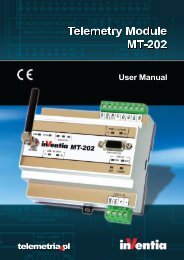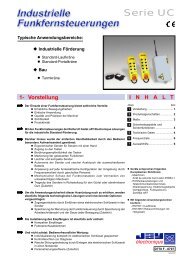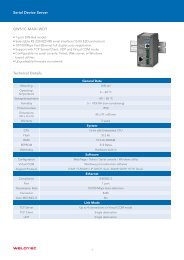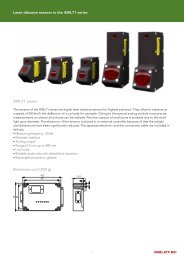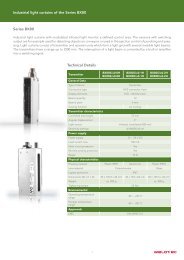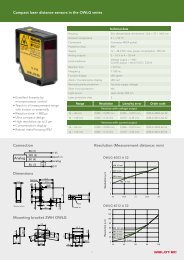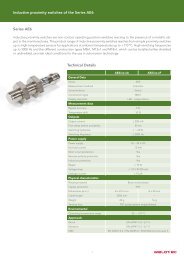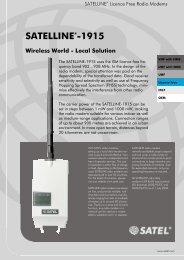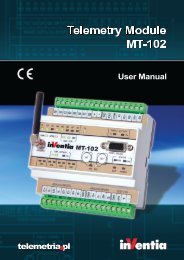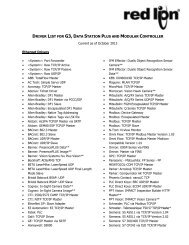Telemetry Module MT-021 User Manual
Telemetry Module MT-021 User Manual
Telemetry Module MT-021 User Manual
Create successful ePaper yourself
Turn your PDF publications into a flip-book with our unique Google optimized e-Paper software.
After reception of SMS message, internal application tries to parse SMS text and execute<br />
command enclosed in it. Parsing process generates new message text, which is send<br />
back to user (if module is allowed to, either by configuration or by presence/absence of<br />
'$' sign).<br />
Commands are formatted as follows:<br />
#[prefix.]symbol[=value]<br />
where:<br />
prefix defines data representation and register count<br />
symbol defines register address and register space being accessed<br />
value defines data to be written to register (s)<br />
Prefix is optional; when not present, data is interpreted according to preset defaults.<br />
Basic read command:<br />
#HR0<br />
When module receives and parses the SMS message containing this command,<br />
command string will be replaced with value of register 0 read from holding registers<br />
space, noted in decimal format, and this value will be put in SMS sent back to user.<br />
Answer to this command sent back will be:<br />
>10<br />
where 10 is value read from holding register 0.<br />
If received SMS contains any other characters than correctly formatted commands,<br />
these characters will be copied unaltered to message being sent back. This allows user<br />
to freely compose text of return message and include register values together with<br />
some informational text. For example, if user sends containing:<br />
Voice call was #IR12 seconds long<br />
then module will answer with:<br />
>Voice call was 15 seconds long<br />
where 15 is a value read from input register 12.<br />
It should be noted that answer from module begins with '>' sign - it means that this SMS<br />
was generated by module. If module receives SMS beginning with '>', such message<br />
will be ignored (not parsed). This prevents endless "looping" of messages in case they<br />
are being exchanged between modules<br />
Writing to register is archived by expanding basic command with '=' sign and value that<br />
should be written:<br />
#HR20=2<br />
<strong>User</strong> should be aware that writing is allowed only to holding register space.<br />
When module receives SMS with write command, it executes the command and sends<br />
back value written. For example, sending to module SMS with text:<br />
#HR1=1234<br />
80




